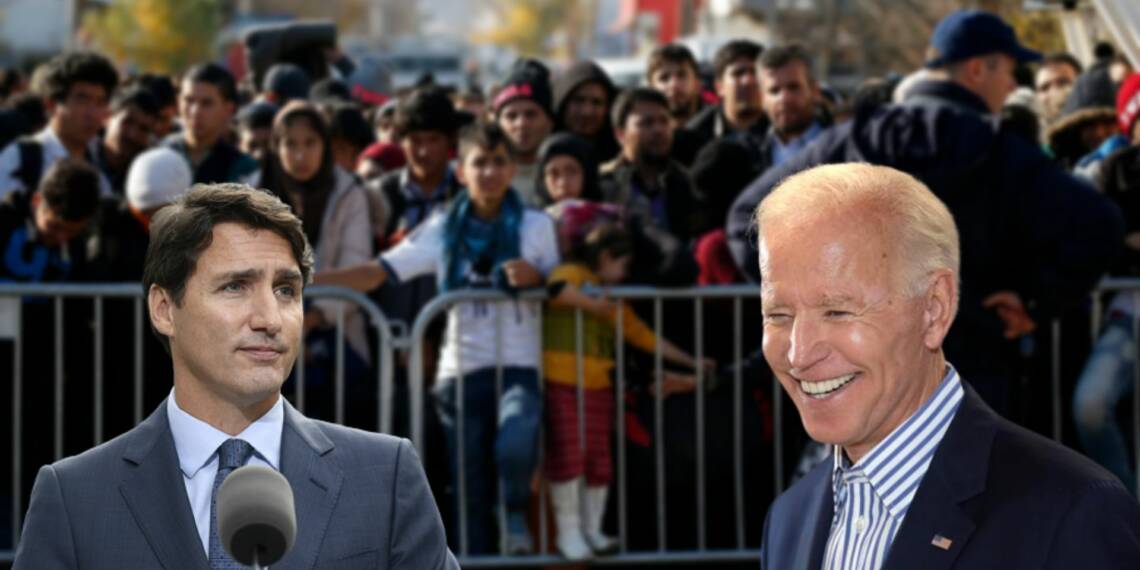Canada benefits from geography. Three of its borders are with the massive Atlantic, Pacific, and Arctic Oceans, and the fourth is with the United States, a country of comparable development. However, what appeared to be a godsend opportunity has now turned into a scourge for Ottawa as a result of Washington’s unscrupulous activities.
News that the City of New York is providing free bus tickets to migrants heading north to claim asylum in Canada highlights an urgent need to address the situation at the border, Quebec’s immigration minister said in an interview.
New York City Mayor Eric Adams said that his administration helps in the “re-ticketing process” for people who arrive in the city but want to go elsewhere. He has previously said the city was being overwhelmed with new arrivals, and he has criticized the practice of some U.S. governors who transport migrants straight from the southern border to the city.
Adams told the news station that the city does not push or force people to leave, but some express a desire to move on to other places, including Canada.
You see, Canada is currently negotiating with the United States to revise the Canada-United States Safe Third Country Agreement, which states that anyone seeking refugee protection must seek asylum in whichever of the two nations they arrive in first.
However, the agreement only applies to formal border crossings, prompting some people to exploit illicit crossing locations like Roxham Road to access Canada.
Asylum seekers are unlawfully crossing the border because a gap in a US deal allows them to file claims and remain in Canada while waiting for the conclusion. Critics have labelled them “illegals,” due to the fact that it is technically illegal to cross the border anyplace other than an established port of entry. However, once in Canada, it is allowed to apply for asylum, a step toward refugee status. When they to go to the official border entry nearby, they could be turned back to the United States under a safe-third-country treaty negotiated between the U.S. and Canada that has been in effect since 2004. But it doesn’t cover the irregular, unofficial crossing points like Roxham Road, which have thus become a popular loophole.
Close to 50,000 have come into Canada in just two years at Roxham Road, stepping across the border at the unauthorized crossing. In 2019, Authorities said 5,083 crossed at Roxham Road, averaging 60 a day. That’s up from 4,397 over the same period in 2018.
They often prearrange taxis in Plattsburgh for the half-hour ride to the border. Since 2017, the route has become so normalized that taxi companies are branding themselves as border shuttles. A sign on one taxi van brazenly reads “Refugee Border.” Another reads “Roxham Border – LaColle Border” and advertises a group rate, with each ride costing between $60 and $80, turning it into a lucrative and steady business.
Simply put, American cities such as New York are incentivizing immigrants to cross illegal borders and settle in Canadian provinces such as Quebec. The annoyance of Quebec officials and citizens alike is understandable. According to federal figures, Quebec received nearly 59,000 of the country’s 92,715 asylum petitions last year, while having less than 25% of the population.
All but a few hundred of the 39,540 people who crossed “irregularly” in between official border points did so in Quebec, overwhelmingly at Roxham Road.
A major part of the problem should be attributed to the Trudeau government’s flawed immigration policy. On a per capita basis, Canada accepts six times as many refugees as the United States and four times the average among members of the Convention on Refugees. This is because Canada’s open welfare system attracts more applicants and because of Canada’s high acceptance rate per cent.
Illegal immigration could also spell security doom for Ottawa. Canada, under Trudeau, would do well to mimic the US uproar. While the US investigates how terrorists gained entry and why those with evident terrorist connections were not watched, Canada ignores deeper issues on this side of the border.
According to security and law enforcement professionals, Canada serves as a safe haven for a number of terrorist organisations. The preferred method of entry is simple: rinse registration papers down the jet’s lavatory (to prevent your story from being traced), claim refugee status at Canada customs, pitch a practised story, and walk out a free terrorist, eligible for welfare, social, and medical benefits unrivalled by any other country.
Also Read: How Canada saw a steep fall in its freedom
In any case, no hardly ever means no. Refugee appeals can take years and cost taxpayers a lot of money in benefits and legal fees. Mohammed Issa Mohammed’s legal fees alone cost Canadian taxpayers $3 million. After being identified as a terrorist, he was deported after entering Canada on a visa. Over a 15-year period, he claimed refugee status and filed 40 appeals while receiving assistance and other social payments with his family.
Reform prospects appear bleak. The immigration/refugee issue has been seized by special interests. The Liberal government has likewise refused to address the gaps in the US treaty.
Immigration, as a concept, has no objective definitions of good or bad. The influx of immigrants in the first part of the twentieth century, sometimes from undesirable ethnic groups, substantially helped Canada. However, Canada’s existing immigration system is fundamentally faulty. Instead of denial, Canada requires a robust debate. Leaders such as Pierre Poilievre have fortunately started to campaign for the closure of the Roxham Road irregular border crossing. With illegal immigration becoming a key election issue, power-hungry Trudeau may be compelled to act swiftly.
https://www.youtube.com/watch?v=s8PpYp3kSwY








